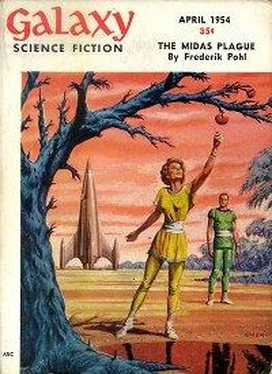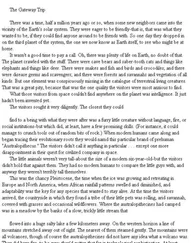Pohl Frederik - The Midas Plague
Здесь есть возможность читать онлайн «Pohl Frederik - The Midas Plague» весь текст электронной книги совершенно бесплатно (целиком полную версию без сокращений). В некоторых случаях можно слушать аудио, скачать через торрент в формате fb2 и присутствует краткое содержание. Год выпуска: 1954, Издательство: Galaxy Publishing Corporation, Жанр: Фантастика и фэнтези, на английском языке. Описание произведения, (предисловие) а так же отзывы посетителей доступны на портале библиотеки ЛибКат.
- Название:The Midas Plague
- Автор:
- Издательство:Galaxy Publishing Corporation
- Жанр:
- Год:1954
- ISBN:нет данных
- Рейтинг книги:5 / 5. Голосов: 1
-
Избранное:Добавить в избранное
- Отзывы:
-
Ваша оценка:
- 100
- 1
- 2
- 3
- 4
- 5
The Midas Plague: краткое содержание, описание и аннотация
Предлагаем к чтению аннотацию, описание, краткое содержание или предисловие (зависит от того, что написал сам автор книги «The Midas Plague»). Если вы не нашли необходимую информацию о книге — напишите в комментариях, мы постараемся отыскать её.
The Midas Plague — читать онлайн бесплатно полную книгу (весь текст) целиком
Ниже представлен текст книги, разбитый по страницам. Система сохранения места последней прочитанной страницы, позволяет с удобством читать онлайн бесплатно книгу «The Midas Plague», без необходимости каждый раз заново искать на чём Вы остановились. Поставьте закладку, и сможете в любой момент перейти на страницу, на которой закончили чтение.
Интервал:
Закладка:
“Indeed you do, sir!” it said warmly. “This morning, in fact. I’ve already instructed the chauffeur and notified your office.”
“Fine! Well, get started on the other things, Henry.”
“Yes, sir,” said Henry, and assumed the curious absent look of a robot talking on its TBR circuits—the “Talk Between Robots” radio-as it arranged the appointments for its master.
Morey finished his breakfast in silence, pleased with his own virtue, at peace with the world. It wasn’t so hard to be a proper, industrious consumer if you worked at it, he reflected. It was only the malcontents, the ne’er-do-wells and the incompetents who simply could not adjust to the world around them. Well, he thought with distant pity, someone had to suffer; you couldn’t break eggs without making an omelet. And his proper duty was not to be some sort of wild-eyed crank, challenging the social order and beating his breast about injustice, but to take care of his wife and his home.
It was too bad he couldn’t really get right down to work on consuming today. But this was his one day a week to hold a job— four of the other six days were devoted to solid consuming—and, besides, he had a group therapy session scheduled as well. His analysis, Morey told himself, would certainly take a sharp turn for the better, now that he had faced up to his problems.
Morey was immersed in a glow of self-righteousness as he kissed Cherry good-by (she had finally got up, all in a confusion of delight at the new regime) and walked out the door to his car. He hardly noticed the little man in enormous floppy hat and garishly ruffled trousers who was standing almost hidden in the shrubs.
“Hey, Mac.” The man’s voice was almost a whisper.
“Huh? Oh-what is it?”
The man looked around furtively. “Listen, friend,” he said rapidly, “you look like an intelligent man who could use a little help. Times are tough; you help me, I’ll help you. Want to make a deal on ration stamps? Six for one. One of yours for six of mine, the best deal you’ll get anywhere in town. Naturally, my stamps aren’t exactly the real McCoy, but they’ll pass, friend, they’ll pass—”
Morey blinked at him. “No!” he said violently, and pushed the man aside. Now it’s racketeers, he thought bitterly. Slums and endless sordid preoccupation with rations weren’t enough to inflict on Cherry; now the neighborhood was becoming a hangout for people on the shady side of the law. It was not, of course, the first time he had ever been approached by a counterfeit ration-stamp hoodlum, but never at his own front door!
Morey thought briefly, as he climbed into his car, of calling the police. But certainly the man would be gone before they could get there; and, after all, he had handled it pretty well as it was.
Of course, it would be nice to get six stamps for one.
But very far from nice if he got caught.
“Good morning, Mr. Fry,” tinkled the robot receptionist. “Won’t you go right in?” With a steel-tipped finger, it pointed to the door marked GROUP THERAPY.
Someday, Morey vowed to himself as he nodded and complied, he would be in a position to afford a private analyst of his own. Group therapy helped relieve the infinite stresses of modern living, and without it he might find himself as badly off as the hysterical mobs in the ration riots, or as dangerously anti-social as the counterfeiters. But it lacked the personal touch. It was, he thought, too public a performance of what should be a private affair, like trying to live a happy married life with an interfering, ever-present crowd of robots in the house—
Morey brought himself up in panic. How had that thought crept in? He was shaken visibly as he entered the room and greeted the group to which he was assigned.
There were eleven of them: four Freudians, two Reichians, two Jungians, a Gestalter, a shock therapist and the elderly and rather quiet Sullivanite. Even the members of the majority groups had their own individual differences in technique and creed, but, despite four years with this particular group of analysts, Morey hadn’t quite been able to keep them separate in his mind. Their names, though, he knew well enough.
“Morning, Doctors,” he said. “What is it today?”
“Morning,” said Semmelweiss morosely. “Today you come into the room for the first time looking as if something is really bothering you, and yet the schedule calls for psychodrama. Dr. Fairless,” he appealed, “can’t we change the schedule a little bit? Fry here is obviously under a strain; that’s the time to start digging and see what he can find. We can do your psychodrama next time, can’t we?”
Fairless shook his gracefully bald old head. “Sorry, Doctor. If it were up to me, of course—but you know the rules.”
“Rules, rules,” jeered Semmelweiss. “Ah, what’s the use? Here’s a patient in an acute anxiety state if I ever saw one—and believe me, I saw plenty—and we ignore it because the rules say ignore it. Is that professional? Is that how to cure a patient?”
Little Blaine said frostily, “If I may say so, Dr. Semmelweiss, there have been a great many cures made without the necessity of departing from the rules. I myself, in fact—”
“You yourself!” mimicked Semmelweiss. “You yourself never handled a patient alone in your life. When you going to get out of a group, Blaine?”
Blaine said furiously, “Dr. Fairless, I don’t think I have to stand for this sort of personal attack. Just because Semmelweiss has seniority and a couple of private patients one day a week, he thinks—”
“Gentlemen,” said Fairless mildly. “Please, let’s get on with the work. Mr. Fry has come to us for help, not to listen to us losing our tempers.”
“Sorry,” said Semmelweiss curtly. “All the same, I appeal from the arbitrary and mechanistic ruling of the chair.”
Fairless inclined his head. “All in favor of the ruling of the chair? Nine, I count. That leaves only you opposed, Dr. Semmelweiss. We’ll proceed with the psychodrama, if the recorder will read us the notes and comments of the last session.”
The recorder, a pudgy, low-ranking youngster named Sprogue, flipped back the pages of his notebook and read in a chanting voice, “Session of twenty-fourth May, subject, Morey Fry; in attendance, Doctors Fairless, Bileck, Semmelweiss, Carrado, Weber—”
Fairless interrupted kindly, “Just the last page, if you please, Dr. Sprogue.”
“Um—oh, yes. After a ten-minute recess for additional Rorschachs and an electro-encephalogram, the group convened and conducted rapid-fire word association. Results were tabulated and compared with standard deviation patterns, and it was determined that subject’s major traumas derived from, respectively—”
Morey found his attention waning. Therapy was good; everybody knew that, but every once in a while he found it a little dull. If it weren’t for therapy, though, there was no telling what might happen. Certainly, Morey told himself, he had been helped considerably —at least he hadn’t set fire to his house and shrieked at the fire-robots, hke Newell down the block when his eldest daughter divorced her husband and came back to live with him, bringing her ration quota along, of course. Morey hadn’t even been tempted to do anything as outrageously, frighteningly immoral as destroy things or waste them— well, he admitted to himself honestly, perhaps a little tempted, once in a great while. But never anything important enough to worry about; he was sound, perfectly sound.
He looked up, startled. All the doctors were staring at him. “Mr. Fry,” Fairless repeated, “will you take your place?”
“Certainly,” Morey said hastily. “Uh-where?”
Читать дальшеИнтервал:
Закладка:
Похожие книги на «The Midas Plague»
Представляем Вашему вниманию похожие книги на «The Midas Plague» списком для выбора. Мы отобрали схожую по названию и смыслу литературу в надежде предоставить читателям больше вариантов отыскать новые, интересные, ещё непрочитанные произведения.
Обсуждение, отзывы о книге «The Midas Plague» и просто собственные мнения читателей. Оставьте ваши комментарии, напишите, что Вы думаете о произведении, его смысле или главных героях. Укажите что конкретно понравилось, а что нет, и почему Вы так считаете.












